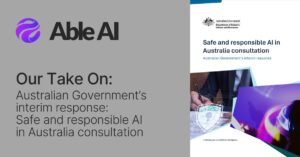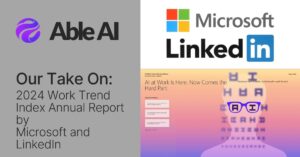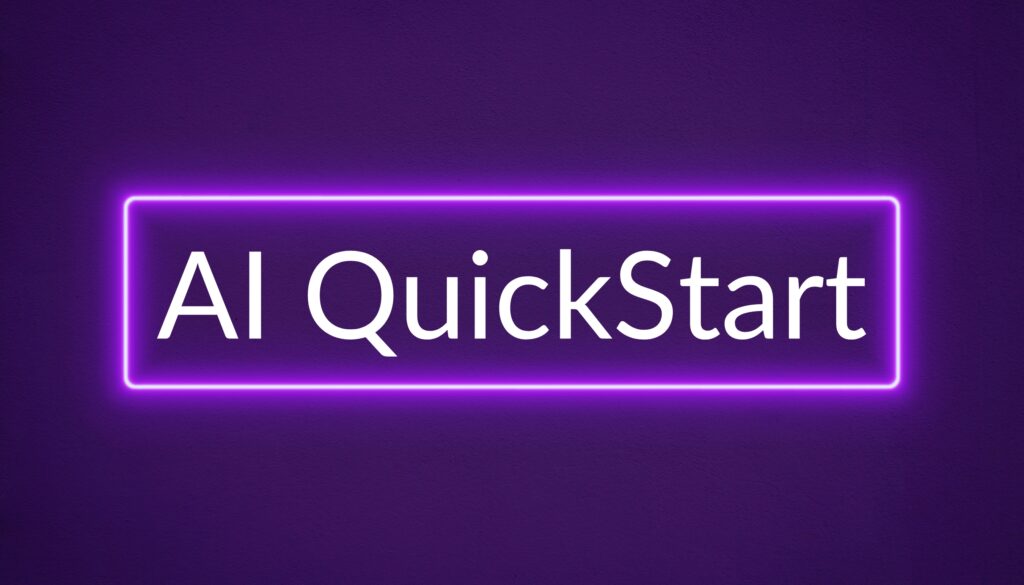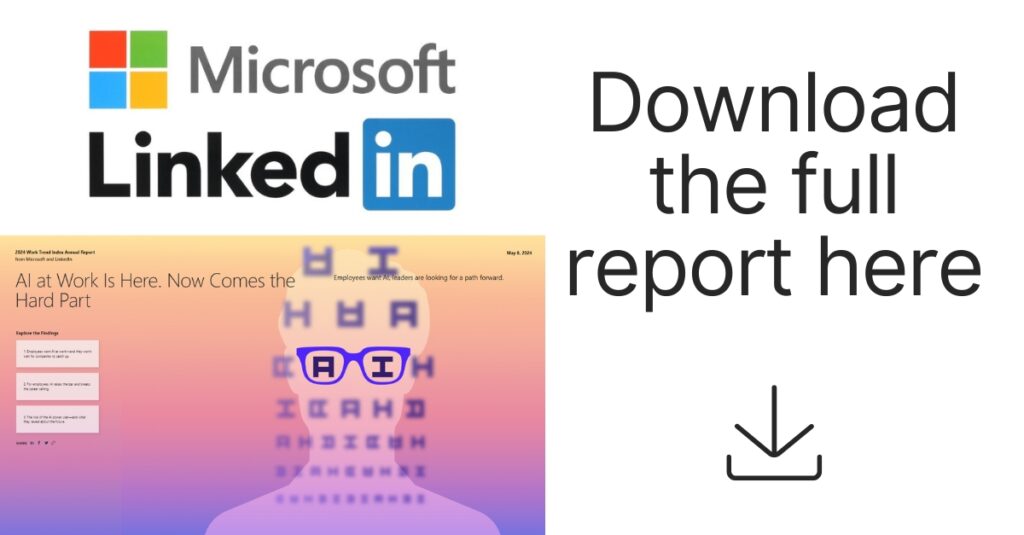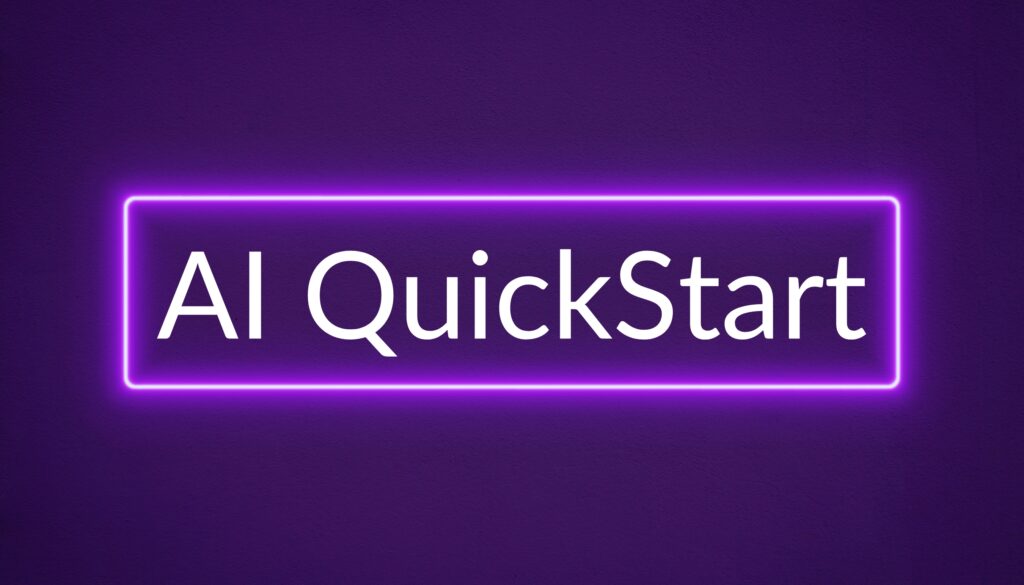The 2024 Work Trend Index Annual Report by Microsoft and LinkedIn provides an insightful exploration into the pervasive integration of AI in modern workplaces. This comprehensive report, surveying over 31,000 people across 31 countries, delves into the accelerating adoption of generative AI, its impact on employees and leaders, and the emerging trends that signal a profound shift in how work gets done. As the AI wave continues to swell, this report underscores the urgency for organisations to adapt and transform. Here, we critically analyse the key findings, the underlying assumptions, and the broader implications for stakeholders in the Australian context and beyond.
AI Adoption: An Unstoppable Wave
The report reveals that 75% of global knowledge workers now use AI at work, with nearly half of them having started in the last six months. This rapid uptake is driven by AI’s ability to save time, enhance focus on important tasks, and boost creativity and job satisfaction. However, the swift pace of adoption also highlights a significant gap: many organisations lack a coherent strategy to harness AI’s full potential. While 79% of leaders acknowledge the necessity of AI to stay competitive, 60% worry their organisations lack a clear plan. This dichotomy presents a critical challenge: how can organisations move from piecemeal experimentation to strategic, transformative AI integration?
The Employee Perspective: Demand Outpacing Supply
Employees are not waiting for top-down mandates; 78% are bringing their own AI tools to work (BYOAI), often without organisational approval. This grassroots adoption indicates a strong desire among employees to leverage AI for efficiency, despite potential risks related to cybersecurity and data privacy. Furthermore, the report highlights that AI is perceived as a career catalyst, with many employees believing that AI skills will open new job opportunities and facilitate faster promotions. This sentiment is particularly relevant in Australia, where the competitive job market increasingly values digital literacy and innovation.
Leaders’ Dilemma: Bridging the Vision-Action Gap
The report identifies a significant disconnect between leaders’ recognition of AI’s importance and their ability to implement it effectively. While 66% of leaders would not hire someone without AI skills, only 39% of AI users have received company-sponsored training. This training deficit is a critical barrier to maximising AI’s potential, suggesting that organisations must prioritise AI education and development to build a future-ready workforce. Moreover, leaders express concern over quantifying AI’s productivity gains, which stymies broader implementation efforts.
The Rise of the AI Power User
A particularly intriguing finding is the emergence of AI power users—employees who extensively use AI and derive substantial benefits from it. These individuals are not only more productive but also more engaged and motivated at work. Power users frequently experiment with AI, suggesting that fostering a culture of innovation and continuous learning is key to unlocking AI’s full potential. For Australian businesses, encouraging such behaviours could be a strategic advantage in the global marketplace.
Global Comparisons and Local Implications
Globally, the adoption and impact of AI vary, with regions like Latin America and Asia-Pacific leading in AI use. This global perspective is essential for Australian policymakers and business leaders, providing benchmarks and best practices for AI integration. For instance, the proactive approach seen in countries like Singapore, where AI training and strategic deployment are prioritised, offers valuable lessons for Australia.
Critical Analysis and Recommendations
While the report is optimistic about AI’s transformative potential, it also highlights several challenges that need addressing:
— Strategic Planning: Organisations must develop clear, actionable AI strategies that align with their business goals. This includes identifying specific areas where AI can drive value, setting measurable objectives, and establishing robust implementation frameworks.
— Training and Development: Bridging the AI skills gap is crucial. Organisations should invest in comprehensive AI training programs for all employees, not just technical staff. This will ensure a broad-based understanding of AI tools and their applications.
— Ethical Considerations: As AI becomes more integrated into business processes, ethical considerations around data privacy, bias, and job displacement must be addressed. Establishing ethical guidelines and ensuring transparency in AI applications are essential steps.
— Leadership and Culture: Fostering a culture of innovation and continuous improvement is key. Leaders should champion AI initiatives and encourage experimentation and learning at all levels of the organisation.
— Policy and Regulation: Policymakers need to create a supportive regulatory environment that encourages AI innovation while safeguarding against potential risks. This includes updating labour laws to reflect the changing nature of work and ensuring that AI applications comply with ethical standards.
Conclusion
The 2024 Work Trend Index Annual Report underscores the transformative potential of AI in the workplace and the urgent need for organisations to move from experimentation to strategic implementation. For Australian businesses, the insights from this report provide a roadmap to navigate the AI revolution. By addressing the strategic, educational, ethical, and cultural dimensions of AI adoption, organisations can harness the full potential of AI to drive growth, innovation, and employee satisfaction. As we stand at the cusp of this technological transformation, the imperative is clear: embrace AI boldly and strategically, or risk being left behind.
References
— Microsoft and LinkedIn. (2024). 2024 Work Trend Index Annual Report. Retrieved from Microsoft
— Edelman Data & Intelligence. (2024). Work Trend Index Survey. Retrieved from Microsoft
— LinkedIn Economic Graph Research Institute. (2024). AI Aptitude Skills Data. Retrieved from LinkedIn
— Microsoft WorkLab. (2024). Copilot Study. Retrieved from Microsoft
— Platt, M. (2024). The Neuroscience of AI in the Workplace. Wharton School of the University of Pennsylvania.
— Hadley, C. N. (2024). The Operational Contract of Work. Boston University Questrom School of Business.
— Jordan, S. (2024). AI Training and Workforce Transformation. Honeywell.
By synthesising these comprehensive insights, Australian businesses can make informed decisions and strategically position themselves in the evolving AI landscape.
Acknowledgments and Disclaimers
Acknowledgment
At Able AI, we deeply value and respect the intellectual contributions of various research institutions, universities, government agencies, and commercial businesses worldwide. The insights and findings presented in our analyses often draw from the exceptional work conducted by these esteemed organisations. We extend our heartfelt gratitude to the authors and researchers whose diligent efforts and groundbreaking studies inform and enrich our own work. Their dedication to advancing knowledge and understanding is truly commendable.
Disclaimer
The content provided in “Our Takes”, including analyses and reports, is based on information from various sources. We make every effort to accurately credit the original authors and institutions for their contributions. All third-party materials cited in our work remain the intellectual property of their respective authors and institutions.
Able AI acknowledges that the original authors hold all rights to their work, and our use of such materials is intended solely for the purpose of providing further insights and perspectives. We do not claim ownership of any third-party content and ensure that it is presented with the utmost respect and integrity.
For further information on the original studies and reports, we encourage our readers to consult the primary sources, which we will always link to. If you believe that any material has been used inappropriately or not adequately credited, please contact us at hello@ableai.com.au so that we can promptly address any concerns.
To stay updated on the latest developments in AI and to read more in-depth analyses of emerging technologies, subscribe to our Newsroom. Join us as we explore the future of AI and its impact on society.

